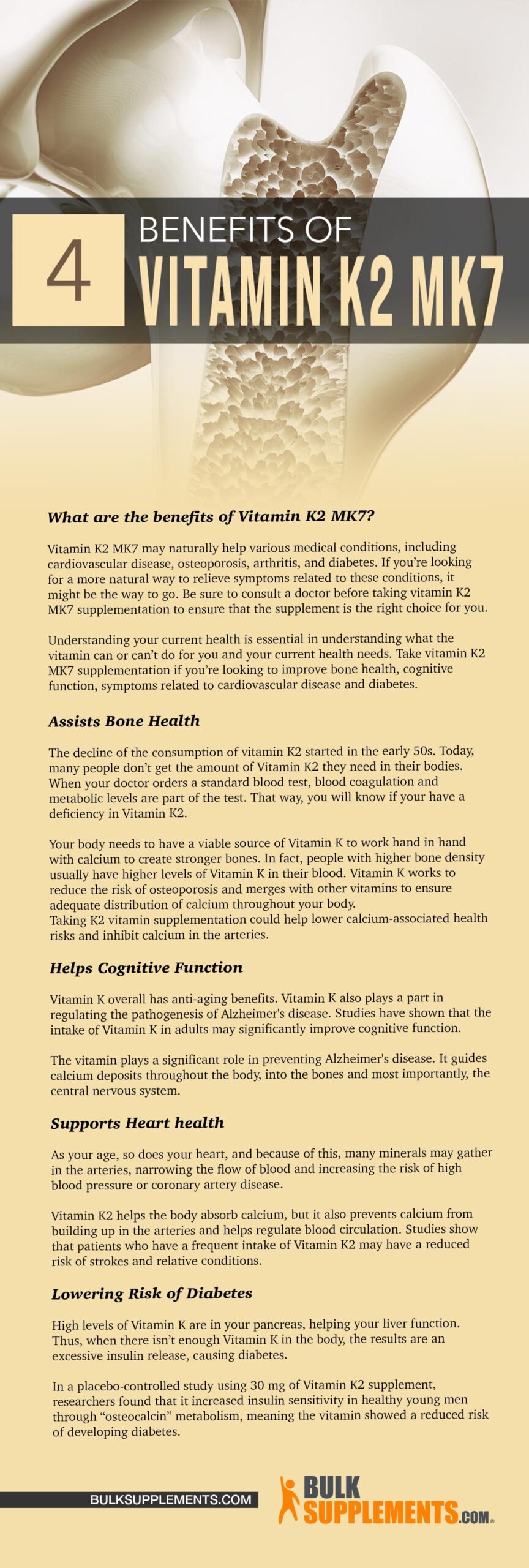Vitamin K2 has a range of potential health benefits, including reducing the risk of osteoporosis, heart disease and cancer. It also appears to promote bone and dental health, and may even reduce the severity of some types of arthritis.
Vitamin K2 has a wide variety of benefits, many of which are still being discovered. Here are just a few of the potential benefits of this important vitamin:
bone and cardiovascular health
cancer prevention
longevity and healthy aging
brain health and cognitive function
Vitamin K2 is an important nutrient for bone and cardiovascular health. It helps to prevent osteoporosis by promoting calcium absorption and preventing calcium deposits in the arteries. Vitamin K2 also helps to protect against heart disease by keeping cholesterol levels in check and preventing hardening of the arteries.

Credit: community.bulksupplements.com
Should You Take Vitamin K2 Everyday?
Whether or not you should take vitamin K2 everyday is a complicated question to answer. Vitamin K2 is a nutrient that is important for many different bodily functions, including blood clotting, bone health, and heart health. However, it can be difficult to get enough vitamin K2 from diet alone, and supplementation may be necessary for some people.
There are two main forms of vitamin K2: MK-4 and MK-7. MK-4 is found in animal products like meat and eggs, while MK-7 is found in fermented foods like natto and cheese. Both forms of vitamin K2 are effective, butMK-7 may be better absorbed by the body.
The recommended daily intake of vitamin K2 is 90 micrograms for adults over 19 years old. However, this amount may need to be increased if you are taking certain medications (like anticoagulants) or have certain medical conditions (like osteoporosis). Speak with your doctor before starting any supplementation regimen to make sure it’s right for you.
What are Symptoms of Low Vitamin K2?
Vitamin K2 is an essential nutrient that the body needs for proper blood clotting, bone health, and heart health. Without enough vitamin K2, people may experience bleeding problems, osteoporosis, or heart disease. Symptoms of low vitamin K2 include easy bruising, heavy menstrual bleeding, nosebleeds, and gastrointestinal bleeding.
People with low vitamin K2 levels may also have a higher risk of developing cancer.
What are the Risks of Taking Vitamin K2?
Vitamin K2 is an essential nutrient that helps the body to clot blood and heal wounds. However, like all vitamins, there are certain risks associated with taking too much vitamin K2. Excessive intake of vitamin K2 can lead to problems with calcium metabolism and bone health, as well as increase the risk of bleeding and bruising.
It is therefore important to speak to a healthcare professional before taking any supplements, particularly if you are taking other medications or have any existing medical conditions.
Can Vitamin K2 Reverse Wrinkles?
As we age, our skin slowly loses its elasticity and ability to repair itself. Fine lines and wrinkles are one of the first visible signs of aging skin. But can vitamin K2 help reverse these signs of aging?
Vitamin K2 is an essential nutrient that helps with blood clotting and bone health. It’s also been shown to improve skin health, including reducing wrinkles. One study found that women who took a vitamin K2 supplement for three years had fewer fine lines and wrinkles than those who didn’t take the supplement (1).
While more research is needed to confirm these results, vitamin K2 appears to be a promising option for reversing the signs of aging skin. If you’re interested in trying it, look for supplements that contain at least 100 micrograms (mcg) of vitamin K2 per serving.
Vitamin K2 | Vitamin K2 Benefits | Vitamin K2 and D3 | Vitamin K2 Foods | Vitamin K
Vitamin K2 Benefits And Side Effects
Vitamin K2 is a nutrient that offers many potential health benefits. It is found in foods like beef, pork, chicken, and dairy products. Some research suggests that it may help to prevent osteoporosis, heart disease, and cancer.
Vitamin K2 is also thought to have anti-inflammatory properties.
While vitamin K2 appears to be safe for most people, there are some potential side effects to be aware of. These include nausea, vomiting, diarrhea, and dizziness.
If you experience any of these side effects after taking vitamin K2 supplements or eating foods rich in this nutrient, stop using them and see your doctor right away.
Vitamin K2 Side Effects
Vitamin K2, also known as menaquinone, is a nutrient that plays an important role in bone and heart health. It’s found in leafy green vegetables, soybeans, and natto (a fermented soy product), and can also be made synthetically. Vitamin K2 supplements are available in both oral and injectable forms.
While vitamin K2 is generally safe, there are a few potential side effects to be aware of. These include:
Allergic reactions: People who are allergic to soy or other legumes may be at risk for an allergic reaction to vitamin K2.
Symptoms of an allergy include itching, swelling, and difficulty breathing. If you experience any of these symptoms after taking a supplement or eating food containing vitamin K2, seek medical attention immediately.
Interactions with medications: Vitamin K2 can interact with some blood-thinning medications such as warfarin (Coumadin).
If you take warfarin or another blood thinner, talk to your doctor before taking a supplement or increasing your intake of foods rich in vitamin K2.
Kidney stones: Some studies have linked high intakes of vitamin K2 to an increased risk of kidney stones.
Vitamin K2 Foods
Vitamin K2 is an essential nutrient that the body needs for proper blood clotting, bone health, and other functions. While vitamin K1 is found in leafy green vegetables, vitamin K2 is found in animal-based foods like meat, eggs, and dairy. It’s also found in fermented soybeans (natto), a traditional Japanese food.
Vitamin K2 has several important benefits for the body:
Blood Clotting: Vitamin K2 helps the blood clot properly, which is important for preventing excessive bleeding. Bone Health: Vitamin K2 is necessary for the production of osteocalcin, a protein that helps to keep bones strong and healthy.
Cardiovascular Health: Some studies have shown that vitamin K2 can help to prevent heart disease by keeping calcium from building up in arteries and veins. Cancer Prevention: Vitamin K2 may also help to protect against some types of cancer, such as prostate cancer.
While most people get enough vitamin K1 from their diet, vitamin K2 is often lacking.
This means that it’s important to include good sources of vitamin K2 in your diet or take a supplement if needed.
Vitamin K2 Benefits Hair
Vitamin K2 is an essential nutrient for hair health. It helps to keep hair follicles strong and healthy, which in turn helps to prevent hair loss. Vitamin K2 also helps to promote new hair growth.
In addition, vitamin K2 can help to prevent dandruff and scalp itchiness.
Vitamin K2 Deficiency
Vitamin K2 is an important nutrient that helps to keep bones healthy and prevent heart disease. However, many people do not get enough Vitamin K2 in their diet and as a result, may be at risk for deficiency.
Symptoms of Vitamin K2 Deficiency can include:
-Weak and brittle bones
-Osteoporosis
-Heart disease
-Arterial calcification
Vitamin K2 works by helping the body to absorb calcium and keeping it in the proper place in the bones and arteries. It is also involved in blood clotting.
People who are deficient in Vitamin K2 are more likely to suffer from bone fractures and arterial blockages. They are also at increased risk for osteoporosis, heart disease, and stroke.
To prevent Vitamin K2 Deficiency, it is important to eat foods that are rich in this nutrient such as dairy products, eggs, liver, meat, and certain vegetables like broccoli and Brussels sprouts.
You can also take supplements containing Vitamin K2 if you feel you are not getting enough through diet alone.
Benefits of Vitamin K2 And D3
Vitamin K2 is an important nutrient that offers a range of health benefits. It is involved in bone and cardiovascular health, and also plays a role in blood clotting. Vitamin K2 can be found in fermented foods, such as cheese and natto, as well as in supplements.
Vitamin D3 is another key nutrient that has numerous health benefits. It helps to build strong bones and teeth, and also aids in muscle function and immunity. Vitamin D3 can be found in fatty fish, eggs, and fortified dairy products.
It can also be made in the body through exposure to sunlight.
Both vitamin K2 and vitamin D3 are essential nutrients for overall health. They offer a wide range of benefits, including supporting bone health, cardiovascular function, blood clotting, immunity, and muscle function.
Vitamin K2 Benefits Skin
Vitamin K2 is an important nutrient for keeping your skin healthy. Here are some of the benefits of vitamin K2 for your skin:
1. Vitamin K2 helps to keep your skin elastic and prevents wrinkles.
2. Vitamin K2 helps to reduce inflammation and redness in the skin.
3. Vitamin K2 can help to heal scars and wounds faster.
4. Vitamin K2 also protects the skin from damage caused by UV rays from the sun.
Conclusion
Vitamin K2 is an essential nutrient required for many bodily functions. It is involved in blood clotting, bone health, and heart health. Vitamin K2 can be found in foods such as leafy greens, broccoli, cheese, and eggs.
Supplements are also available.

